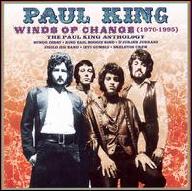But even they never sold more than Paul King, whose founding membership of British jug band Mungo Jerry saw him helm a string of massive hits, including the worldwide (and still selling) smash In the Summertime, Baby Jump, and Lady Rose. It was during this period, too, that King cut his first solo album, the triumphant Been in the Pen Too Long, largely relying on songs written for Mungo Jerry but rejected by vocalist Ray Dorset because they didn't suit the band's image. Now rightly regarded as a minor classic, Been in the Pen Too Long sold poorly upon its release. King, however, was sufficiently satisfied with the critical response that, within months of its release, he and pianist Colin Earl both quit Mungo Jerry, and linked up with bassist Russell John Brown, and both Dave Lambert and Joe Rush from the Pen sessions to form the King Earl Boogie Band.
Strawbs mainstay Dave Cousins was recruited as producer and Trouble at Mill, its title lifted from a then-current #Monty Python sketch, was released in late 1972, accompanied by the contentious Christmas novelty single, the country pastiche Plastic Jesus. An apparent instant hit, the single was instead crushed by the resultant outcry and bans, prompting the almost-immediate break-up of the band. Even as a second single, Goin' to German, was readied for release, Lambert departed to join Cousins' own Strawbs, while King announced his immediate retirement from the music industry.
True to his word, he spent the next year breeding dogs, but by early 1974 he was scheming a comeback under the name D'Jurann Jurann, releasing a single dedicated to the oddly popular pastime of removing one's clothes and Streakin' through the neighborhood. Unfortunately, Ray Stevens had exactly the same idea and, while his record went on to top charts around the world, King's effort sank without a trace.
A year or so later, King resurfaced as the immortally named Levi Grumble, and talked of recording a concept album based around the signs of the Zodiac. However, he abandoned recording less than halfway through, and it would be another five years before he resurfaced, this time with the Jigilo Jug Band, and a 12" single, Live at the Limping Whippet. Another single, Hey Rosalyn, slipped out on Red Bus in 1983, this time credited to P. King and the following year, he reunited with another Pen sideman, Steve Bloomfield, as Russian Roulette. That band, too, released just one single, Come Into My Room, before disappearing. Another outfit, Rhode Island Red, at least went into the studio with Denny Laine, but released nothing. More successful was a reunion with Colin Earl in Skeleton Krew, a band completed by Colin Pattenden (ex-Manfred Mann's Earth Band and former Nashville Teen Ian Campbell). A popular draw on the London live circuit, the band released a live album, The Complete Works, before folding around the same time as King began work on a new solo album, Houdini's Moon. Comprising 13 tracks worth of new material and six unreleased songs "from the archives," Houdini's Moon was released in 1995 to little fanfare, but encouraging sales, and the following year saw King and Earl re-form the King Earl Boogie Band for a new album, aptly titled The Mill Is Gone.
King retired once again in 1996; the King Earl Boogie Band, however, continues to this day. ~ Dave Thompson, Rovi



















